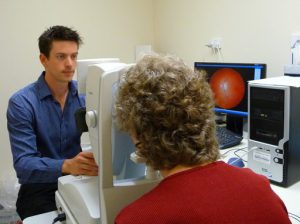New study shows that Alzheimer’s may be detected through certain eye tests.
Losing the crisp, clean abilities of vision is a natural part of getting older. As we age, some people may find that their prescription may change, they may require glasses or bifocals for the first time in their lives, and they may even fall victim to common vision problems such as cataracts or glaucoma.
While all of these can be natural parts of the aging process for some people, for others, getting older may bring about serious problems with your health that could ultimately affect otherwise healthy vision.

One specific type of disease that has been closely related to senior vision difficulties is Alzheimer’s. This age-related disease can cause a variety of different vision problems in those diagnosed: difficulty judging distances close and far away, trouble differentiating colors and contrasts, problems with vision perception, and even difficulty with every day reading and sight.
In fact, nearly 60% of those who were diagnosed with the condition Alzheimer’s experienced a loss in visual capacities in one or more areas of their eyesight. However, most of the time these changes are not caused by problems within the eyes themselves; Instead, the capabilities of the brain are affected and unable to perceive normal visual signals.
Because of this, many scientists have identified several drastic changes in vision that may be early warning signs of Alzheimer’s. However, before we dive into these most common vision problems, it is important to understand just what this serious disease is:
What Is Alzheimer’s?
Alzheimer’s disease is the most common form of dementia, affecting more than 5.4 million Americans and 35 million people worldwide. This awful disease currently has no cure and helpful drugs are only able to temporarily ease it’s symptoms which include memory loss, confusion, difficulty completing tasks, social withdrawal, irritability, etc.
While brain scans can help to uncover evidence of Alzheimer’s a decade or more before it causes memory and thinking problems, these tests are far too expensive and impractical for routine use. Luckily, new studies are showing that simple eye tests and warning signs can be a big help in preparing patients and their families for the effects of this disease.
How Do Eye Tests Discover Alzheimer’s?
Recent vision studies by scientists in Australia have shown encouraging results that doctors hope may lead to a noninvasive way to detect early signs of Alzheimer’s. These tests involved a series of procedures which involved photographing blood vessels in the retina―the nerve layer that lines the back part of the eyes―in order to measure the width of these blood vessels.
Researchers then compared the retinal photos that were taken of 110 healthy people, 13 people diagnosed with Alzheimer’s and 13 others that suffered from mild cognitive impairment or “pre-Alzheimer’s.” The results showed that the widths of certain blood vessels in the patients who suffered from Alzheimer’s were much different from the vessels in the other patients.
Because eye doctors are usually among the first doctors to see patients who have signs of Alzheimer’s, incorporating similar tests that measure the width of blood vessels may help to uncover early warning signs of this common disease. However, scientists are still working hard to determine how else doctors may be able to uncover Alzheimer’s symptoms within a person’s vision.
Whether or not you think you or someone you know may be suffering from the vision affects brought on by Alzheimer’s, it is always important to get regular vision checkups, especially during your senior years. Getting regular checkups is not only good for the health of your eyes, but it also will ensure that your vision stays strong and crisp well into your golden years.
Image: Source